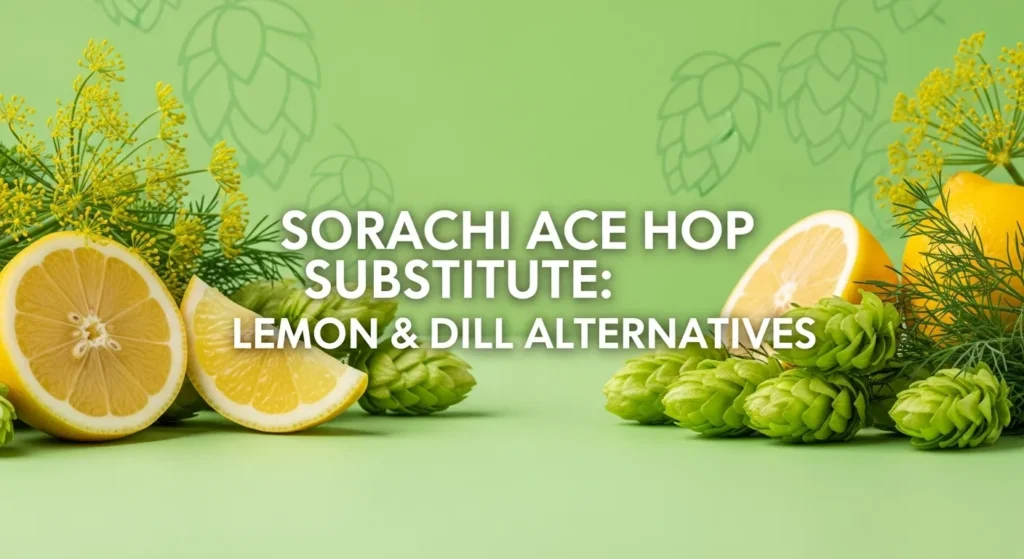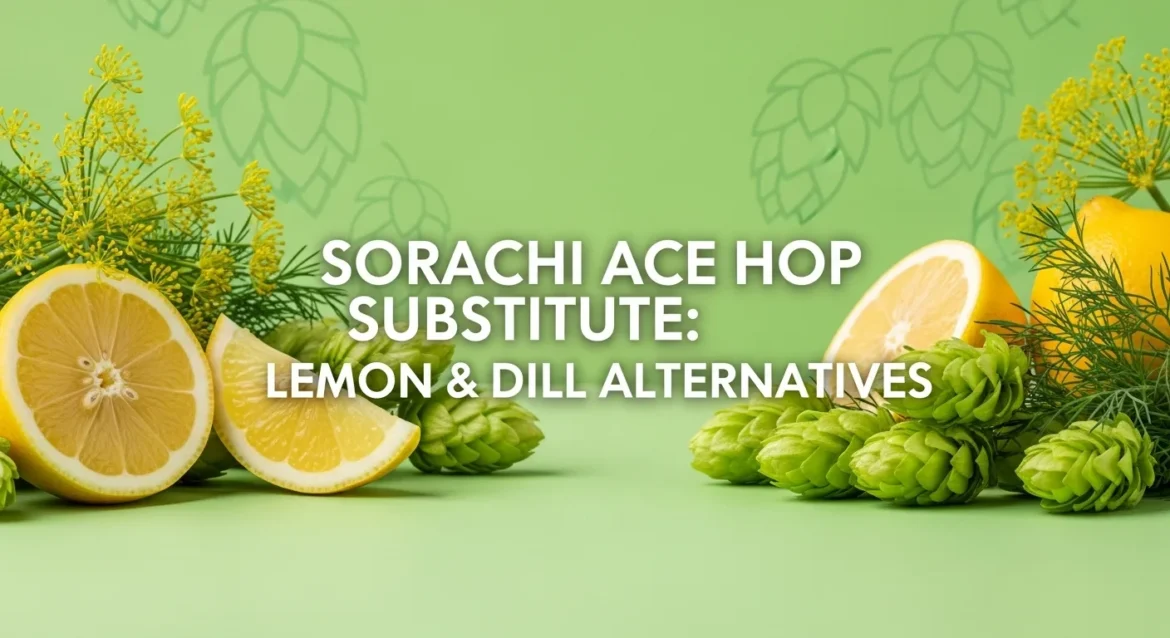Find the best Sorachi Ace hop substitutes with lemon and dill character. Discover American, German, and New Zealand alternatives for saisons and experimental beers.

Planning that experimental saison around Sorachi Ace hops only to discover they’re sold out everywhere? I’ve faced that exact frustration more times than I care to admit in my brewing career. This polarizing Japanese-American hop has developed a cult following for its unmistakable lemon-dill character, creating demand that occasionally exceeds availability at local suppliers. The good news? Several hop varieties can approximate those distinctive lemon, herbal, and lemongrass notes that make Sorachi Ace so special for craft beer brewing, though replicating its specific dill component proves challenging.
Finding the right Sorachi Ace hop substitute requires understanding what makes this hop uniquely polarizing beyond just lemon character. It’s about capturing that distinctive combination of intense lemon with herbal dill-coriander backing and moderate-high alpha acids that creates bold, unmistakable profiles. After brewing with Sorachi Ace and testing various alternatives over the past eight years, I’ve identified which substitutes actually deliver on their lemon promises and which fall disappointingly short when intense citrus-herbal character matters.
This guide explores proven alternatives that approximate Sorachi’s character while adding different dimensions. Whether you’re brewing a Belgian-style saison, experimental IPA, or witbier, you’ll find practical solutions that work.
Understanding Sorachi Ace’s Lemon-Dill Magic
Sorachi Ace emerged in the late 1970s from Sapporo Breweries in Japan as a cross of Brewer’s Gold, Saaz, and Beikei No. 2. This dual-purpose hop delivers lemon, dill, herbal, lemongrass, and coriander characteristics with moderate-high alpha acids of 10-16%. What distinguishes Sorachi Ace from other lemon hops is its remarkably specific dill-herbal component that creates polarizing character – brewers either love its bold eccentricity or find the dill notes overwhelming.
The hop’s American cultivation began in the 1980s but remained obscure until Brooklyn Brewery’s use in their Sorachi Ace single-hop beer brought it mainstream attention around 2010. Sorachi’s high alpha acids create efficient bittering while its massive aromatic impact dominates where subtler hops whisper.
When I first brewed with Sorachi Ace in an experimental saison five years ago, the intense lemon-dill aroma divided tasters – half loved its bold character while others found it too assertive. That polarizing specificity is Sorachi’s magic – unmistakable enough to define beers yet eccentric enough to require careful application.
Top Sorachi Ace Hop Substitute Options
Lemondrop: Clean Lemon-Mint
Lemondrop stands as the most accessible Sorachi Ace substitute for brewers seeking lemon character without dill. This American variety delivers lemon, mint, green tea, melon, and herbal with low alpha acids of 4-7% that require quantity adjustments.
Released by Hopsteiner in 2012 as experimental variety 01210, Lemondrop shares Sorachi’s emphasis on lemon while offering mint-tea complexity instead of dill-herbal. The hop’s clean lemon expression creates approachable alternatives when Sorachi’s eccentric dill proves too polarizing.
I’ve successfully substituted Lemondrop for Sorachi Ace in wheat beers and pale ales by using approximately 1.5-2× the amount by weight to compensate for dramatically lower alpha acids. The beer’s character emphasizes clean lemon-mint rather than intense lemon-dill, creating more approachable profiles. Use Lemondrop when you want lemon character without herbal eccentricity from the Brewers Association standards.
Hallertau Blanc: Lemongrass-Tropical
Hallertau Blanc brings white grape, lemongrass, passion fruit, pineapple, and gooseberry with moderate alpha acids of 9-12%. This modern German hop from Hull breeding program provides lemongrass character that can approximate Sorachi’s herbal-citrus component while adding tropical complexity.
Released in 2012 as daughter of Cascade, Hallertau Blanc shares modern aromatic breeding goals. The hop’s specific lemongrass component echoes Sorachi’s herbal-lemon nature while substituting tropical fruit for dill, creating more universally appealing profiles.
When substituting Hallertau Blanc for Sorachi Ace, use approximately 80-100% of original amounts thanks to similar alpha acids. The beer shifts toward lemongrass-tropical rather than lemon-dill, creating sophisticated fruit-forward alternatives suitable for Belgian ales and experimental wheat beers.
Cascade: Classic Grapefruit-Citrus
Cascade delivers grapefruit, floral, spicy, and citrus with low alpha acids of 4.5-7%. This legendary American hop provides citrus character that can replace Sorachi’s lemon component while lacking herbal dill entirely.
Released in 1972, Cascade defined American Pale Ale through clean citrus expression. While lacking Sorachi’s specific lemon-dill character, Cascade’s approachable citrus-floral profile creates accessible foundations when Sorachi proves too polarizing.
Use approximately 1.5-2× as much Cascade by weight when substituting for Sorachi due to dramatically lower alpha acids. The beer’s character shifts toward grapefruit-floral rather than lemon-dill, creating classic American pale ale profiles instead of experimental lemon-herbal character.
Motueka: Kiwi Lime-Lemon
Motueka offers lime, lemon, tropical fruit, and floral with low-moderate alpha acids of 6.5-7.5%. This New Zealand variety provides lemon-citrus character similar to Sorachi’s lemon component while emphasizing lime-tropical instead of dill-herbal.
Released from New Zealand breeding, Motueka shares emphasis on bright citrus character. While lacking Sorachi’s dill component, Motueka’s clean lemon-lime profile creates refreshing alternatives when herbal character isn’t critical.
When substituting Motueka for Sorachi Ace, use approximately 1.3-1.6× original amounts to compensate for moderately lower alpha acids. The hop’s lime-lemon character differs from Sorachi’s lemon-dill but maintains bright citrus-forward profiles suitable for pale ales and lagers.
Centennial: Lemon-Citrus Balance
Centennial brings floral, citrus, lemon, orange, and pine with moderate alpha acids of 9.5-11.5% that match Sorachi’s range closely. This American classic provides lemon-citrus character with balanced bittering that approximates Sorachi’s dual-purpose versatility.
Released in 1990 as “Super Cascade,” Centennial shares balanced citrus character. While lacking Sorachi’s dill-herbal component, Centennial’s clean lemon-orange profile creates versatile alternatives when approachability matters more than eccentricity.
Use approximately 90-110% of Sorachi quantities when substituting Centennial thanks to similar alpha acids. The beer’s character emphasizes balanced citrus-floral rather than intense lemon-dill, creating more traditional hop-forward profiles.
Mandarina Bavaria: German Tangerine
Mandarina Bavaria delivers mandarin, orange, tangerine, and sweet citrus with moderate alpha acids of 7-10%. This German variety provides citrus character that can replace Sorachi’s lemon component with different specific fruit emphasis.
Released from Hull breeding in 2012, Mandarina Bavaria shares modern German aromatic breeding. While lacking Sorachi’s lemon-dill specificity, Mandarina’s bold mandarin-orange creates interesting citrus alternatives when tangerine proves more appealing than lemon-dill.
When substituting Mandarina Bavaria for Sorachi Ace, use approximately 1.2-1.5× original amounts to compensate for moderately lower alpha acids. The hop’s mandarin-orange character differs significantly from Sorachi’s lemon-dill but provides equally bold citrus suitable for experimental beers.
Blending Strategies for Complete Substitution
The 70/30 Lemon-Herbal Blend
My most successful Sorachi replacement combines 70% Lemondrop with 30% Hallertau Blanc. This blend captures Lemondrop’s clean lemon while Hallertau Blanc adds lemongrass-herbal complexity approximating Sorachi’s lemon-herb profile without dill eccentricity. The combination creates more approachable character than Sorachi’s polarizing dill.
Calculate your total hop bill first, then split according to this ratio for all post-boil additions. Use increased quantities (approximately 1.3-1.7× original Sorachi amounts) to compensate for lower combined alpha acids while achieving similar aromatic impact.
The Citrus Triple Threat
For maximum citrus complexity without dill, blend 50% Cascade, 30% Centennial, and 20% Motueka. This combination emphasizes citrus diversity – grapefruit from Cascade, lemon-orange from Centennial, and lime-lemon from Motueka creating layered profiles.
Use this blend at increased quantities (approximately 1.4-1.8× original Sorachi amounts) to compensate for lower combined alpha acids. The multi-variety citrus approach creates accessible alternatives when Sorachi’s eccentric dill proves too polarizing.
Single-Hop Simplicity
Sometimes simplicity wins. For straightforward beers where lemon matters most, Lemondrop alone provides the most direct lemon substitution despite requiring dramatically increased quantities. Use 1.5-2× Sorachi amounts to compensate for much lower alpha acids.
For beers demanding similar alpha acids without lemon specificity, Centennial by itself works beautifully at equivalent weights. The hop’s balanced citrus creates traditional alternatives when Sorachi’s intense lemon-dill isn’t critical.
Beer Style Considerations
Saisons and Belgian Ales
These experimental styles showcase Sorachi Ace beautifully. Lemondrop or Hallertau Blanc work well as substitutes, providing lemon-citrus character that complements Belgian yeast complexity without overwhelming phenolic and ester profiles.
Use moderate hopping rates (1-1.5 oz per gallon total) allowing yeast character to remain prominent. Late additions and light dry hopping work best, letting hop lemon-herbal integrate with spicy Belgian esters.
Witbiers and Wheat Beers
Light wheat styles benefit from Lemondrop or Motueka substitutions that provide gentle lemon-citrus complementing wheat’s grainy sweetness and traditional coriander-orange peel spicing.
Use restrained hopping rates (0.75-1.25 oz per gallon total) maintaining balance between hop citrus, wheat malt, and traditional spicing. Sorachi’s intense lemon-dill often overpowers delicate wheat beer balance.
Experimental IPAs
Bold hop-forward styles showcase Centennial or Hallertau Blanc where pronounced citrus character matters more than Sorachi’s specific dill eccentricity.
Keep total hop rates generous (2-4 oz per gallon across all additions) but avoid Sorachi’s polarizing dill that can clash with modern fruit-forward IPA expectations.
Here is the comparison chart:
Sorachi Ace Hop Substitute Comparison Chart – Alpha Acids, Flavors, and Beer Style Compatibility
Timing Your Hop Additions for Lemon Character
Moderate Bittering Efficiency
Sorachi Ace’s moderate-high alpha acids (10-16%) create efficient bittering. When using lower-alpha substitutes like Lemondrop or Cascade, increase quantities proportionally for equivalent bitterness.
I typically minimize Sorachi in bittering additions (0.25-0.5 oz per gallon at 60 minutes) because its intense lemon-dill character becomes harsh when boiled extensively. Focus substitutes similarly on late additions where lemon aromatics shine.
Late Boil Excellence
The 5-15 minute window captures lemon-citrus without harsh dill. Lemondrop and Hallertau Blanc excel here, releasing lemon and lemongrass character that integrates smoothly.
Add 0.75-1.5 oz per gallon at 10 minutes for experimental styles. This timing extracts maximum lemon flavor while preserving delicate aromatics that would be lost during extended boiling.
Whirlpool and Flameout Dominance
Late additions at 170-180°F for 20-30 minutes maximize lemon-herbal character while controlling bitterness. This technique perfectly suits all Sorachi substitutes by preserving delicate lemon aromatics.
Use generous whirlpool quantities (1.5-2.5 oz per gallon) with lower-alpha substitutes like Lemondrop and Motueka. For higher-alpha varieties like Centennial and Hallertau Blanc, use 1-1.5 oz per gallon to avoid excessive bitterness.
Dry Hopping Magic
Dry hopping extracts pure lemon aromatics without bitterness or dill harshness. Add hops when fermentation is 75% complete (around day 3-4) to maximize biotransformation.
Use 2-4 oz per gallon for experimental saisons and IPAs, 1.5-2.5 oz per gallon for wheat beers, and 1-2 oz per gallon for Belgian ales. Lemondrop and Hallertau Blanc benefit from 3-5 day contact time, while Cascade should be limited to 4-6 days.
Adjusting for Alpha Acids and Character
Understanding Sorachi’s High Profile
Sorachi Ace’s moderate-high alpha acids (10-16%) create substantial bittering potential that low-alpha substitutes can’t match directly. When using Lemondrop (5.5% AA) to replace Sorachi (13% AA), use approximately 2.4× the amount for equivalent bitterness.
Use this formula: (Sorachi AA% ÷ Substitute AA%) × Original Amount = Substitute Amount. Most substitutes require 1.2-2.5× original quantities depending on specific alpha acid percentages.
Oil Content and Complexity
Sorachi’s massive oil content (1.5-3.0 mL/100g) creates intense aromatic impact. Substitutes with different oil compositions create distinct character – Lemondrop emphasizes lemon-mint, Hallertau Blanc adds lemongrass-tropical, and Cascade provides grapefruit-floral.
When blending substitutes, layer varieties with complementary profiles – Lemondrop’s lemon plus Hallertau Blanc’s lemongrass approximates Sorachi’s lemon-herb nature more authentically than single hops without the polarizing dill.
Water Chemistry for Citrus Expression
Moderate Sulfate for Brightness
Moderate sulfate levels (150-200 ppm) accentuate lemon-citrus character from Sorachi substitutes without creating harsh edges. This mineral profile brings forward citrus while maintaining drinkability.
For Sorachi substitutes in saisons and experimental beers, target moderate 1.5:1 to 2:1 sulfate-to-chloride ratios. This balance supports bright citrus character while maintaining smooth mouthfeel appropriate for Belgian-style ales.
pH and Bright Flavors
Proper mash pH (5.2-5.6) affects how lemon-citrus character expresses. Target moderate pH (5.3-5.5) that supports bright hop character without harsh acidity that would clash with intense lemon notes.
Yeast Strain Synergies
Belgian Saison Yeast Enhancement
For saisons, traditional saison yeasts (WLP565/T-58, WLP566) create complementary phenolic-ester profiles that enhance lemon-citrus hop character beautifully.
Ferment warmer (72-78°F) to encourage characteristic saison esters while allowing hop lemon to add refreshing backing. The combination creates classic saison complexity with modern citrus appeal.
Clean Ale Yeast
For experimental ales, neutral American yeasts (WLP001/US-05) provide clean canvases where lemon-citrus hop character dominates without yeast interference.
Ferment at moderate temperatures (66-68°F) to minimize yeast-derived flavors. The clean profile lets Sorachi substitutes’ lemon character express fully.
Sourcing and Availability
Sorachi Ace Accessibility
Sorachi Ace enjoys moderate-good availability through American hop suppliers thanks to domestic cultivation. When available, expect moderate pricing ($12-18 per pound) comparable to specialty American varieties.
The hop’s cult following creates steady demand but reliable domestic production maintains reasonable availability for adventurous brewers.
Substitute Availability
Most Sorachi substitutes enjoy excellent availability. Lemondrop, Cascade, Centennial, and Motueka stock reliably through major suppliers year-round at reasonable prices ($10-18 per pound). German varieties like Hallertau Blanc and Mandarina Bavaria maintain moderate availability through specialty suppliers.
Storage Best Practices
Store all hops in oxygen-barrier bags in your freezer at 0°F or below. Delicate lemon aromatics are particularly vulnerable to oxidation and should be used within 6-9 months for peak lemon character.
Common Substitution Mistakes
Expecting Exact Dill Replication
No substitute perfectly replicates Sorachi’s specific dill-coriander component. Substitutes emphasize lemon-citrus while avoiding the polarizing dill that makes Sorachi unique.
Under-Hopping Low-Alpha Substitutes
Maintaining Sorachi hopping rates when using much lower-alpha Lemondrop creates insufficient bitterness and aromatics. Adjust quantities proportionally based on alpha acid ratios.
Wrong Style Applications
Using intense lemon hops in delicate lagers or malty styles often disappoints when bold citrus overwhelms subtle character. Match Sorachi substitutes to appropriate experimental styles – saisons, witbiers, IPAs.
Frequently Asked Questions
What is the closest substitute for Sorachi Ace hops?
Lemondrop provides closest lemon match with similar citrus intensity despite lower alpha acids. For complete profile approximation, blend 70% Lemondrop with 30% Hallertau Blanc to capture both lemon and herbal-lemongrass. Centennial offers convenient alpha acid matching with balanced lemon-citrus.
Can I use just one hop instead of Sorachi Ace?
Yes, single-hop substitutions work depending on priorities. Lemondrop excels in wheat beers emphasizing clean lemon. Centennial suits IPAs needing similar alpha acids with balanced citrus. Hallertau Blanc works in Belgian ales. No substitute replicates Sorachi’s specific dill component.
How much substitute hop should I use compared to Sorachi Ace?
For Lemondrop (5.5% AA) replacing Sorachi (13% AA), use approximately 2.4× the amount for equivalent bitterness. For Hallertau Blanc (10.5% AA), use about 1.2× original amounts. For Centennial (10.5% AA), match weights closely. Adjust late additions based on desired aromatic intensity.
Do these substitutes work in all beer styles?
Sorachi substitutes adapt well across experimental styles. Lemondrop and Motueka suit wheat beers and saisons. Centennial and Hallertau Blanc work in IPAs and Belgian ales. Avoid intense lemon hops in delicate lagers or malty styles where citrus overwhelms.
When should I add these hops during brewing?
Minimize bittering additions (0.25-0.5 oz per gallon) to avoid harsh lemon. Emphasize late additions at 10-15 minutes (0.75-1.5 oz per gallon), generous whirlpool (1.5-2.5 oz per gallon), and substantial dry hopping (2-4 oz per gallon) where lemon character shines brightest.
Will my beer taste exactly the same with substitutes?
No substitute perfectly replicates Sorachi’s exact lemon-dill combination. Well-chosen alternatives create equally delicious beers emphasizing lemon-citrus without polarizing dill. Lemondrop provides clean lemon-mint, Hallertau Blanc adds lemongrass-tropical, and Centennial offers balanced lemon-orange.
Where can I buy these substitute hops?
Major online suppliers like Yakima Valley Hops, Northern Brewer, and BSG Craft Brewing stock Lemondrop, Cascade, Centennial, and Motueka year-round. German varieties (Hallertau Blanc, Mandarina Bavaria) require specialty suppliers with European hop programs.
How should I store substitute hops?
Store all hops in oxygen-barrier packaging (vacuum-sealed mylar bags) in freezer at 0°F or below. Delicate lemon aromatics maintain quality for 6-9 months frozen, with subtle herbal notes fading faster. Use freshest hops for dry hopping where lemon character matters most.
Making Your Final Choice
Selecting the perfect Sorachi Ace hop substitute depends on your beer style, tolerance for eccentricity, and hop availability. Lemondrop offers safest lemon matching for brewers seeking bright citrus in wheat beers and saisons where clean lemon character matters without polarizing dill.
Hallertau Blanc provides lemongrass alternative for brewers seeking German quality with tropical complexity. Its sophisticated fruit-herbal profile works beautifully in Belgian ales and experimental beers where nuanced character matters.
Centennial delivers convenient alpha acid matching for brewers seeking minimal quantity adjustments. Its balanced citrus creates versatile alternatives in IPAs and pale ales when Sorachi’s eccentric dill proves too polarizing.
Remember that Sorachi Ace’s uniqueness means substitutions create different rather than identical beers. Embrace the creative process of discovering new flavor combinations that honor Sorachi’s lemon spirit without its divisive dill character.
Don’t be afraid to experiment with blends, adjust quantities based on your palate preferences, or combine varieties to create unique profiles. The craft brewing community continues proving that thoughtful substitution drives innovation.
Whether you’re crafting an experimental saison, refreshing witbier, or bold IPA, these Sorachi substitutes will help you create exceptional beer that captures lemon-citrus character. Trust your ingredients, brew with creativity, and embrace the experimental spirit that makes homebrewing so rewarding.
About the Author
Dave Hopson is a certified Cicerone and beer historian who has visited over 200 breweries across 15 countries. With a background in anthropology and culinary arts, Dave brings a unique perspective to understanding beer’s cultural significance and unique hop varieties from around the world. He specializes in documenting regional brewing traditions and how they’ve evolved with modern craft movements. His research on indigenous fermentation practices and international hop varieties has been featured in several brewing publications. When not exploring brewing cultures, Dave hosts the popular podcast “Hop Tales,” where he interviews brewers about their cultural inspirations and brewing philosophies. Connect with him on Instagram for global beer culture insights and unique hop variety explorations.

